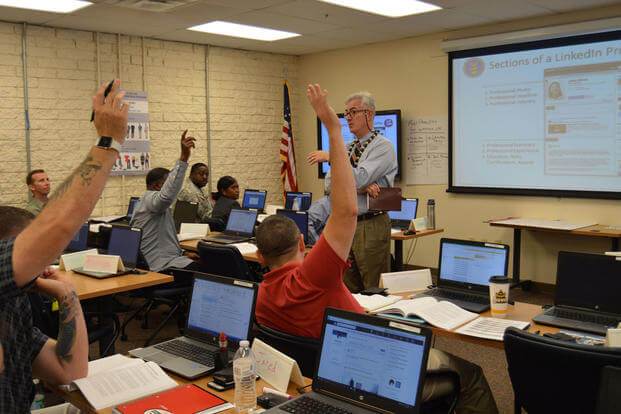Service members will have to complete a program meant to help them transition into civilian life sooner as the new Transition Assistance Program (TAP) requirements become effective Oct. 1.
All active-duty military, including National Guard and reservists, who served continuously for 180 days now have to meet with an initial TAP counselor, attend pre-separation counseling and start his or her individual transition plan one year before leaving or retiring, among other new requirements.
The Department of Veterans Affairs estimates about 200,000 service members are expected to transition to civilian life annually in the next four years.
"Although transition preparation is embedded as part of a service member's military life cycle, these changes will tailor TAP to meet individual needs and with a look at their unique transition experience to best prepare for civilian life," Tamre Newton, Transition to Veterans Program Office director, said in a statement when the change was announced in April.
Congress made TAP training mandatory in fiscal 2011, when veteran unemployment was still lagging from the recession at 12.1 percent while non-veterans were at 8.7 percent. It is a program made up by several different federal departments, including the Defense Department, the VA and the Department of Education.
In its latest Military to Civilian report, the VA staff wrote that a younger, more diverse population of people who served is affecting how members should be trained to transition into civilian life.
Commanders will still verify a service member has achieved career readiness standards with the Capstone event, but it must be done no later than 90 days before leaving.
"Not only are individual goals and needs addressed during the individualized counseling," Newton said, "but transitioning service members also receive more information on these topics during TAP."
TAP's new requirements will have service members choose at least one of four new "tracks" that they can use when developing their transition plan and post-transition goals. The two-day instructional tracks are the Department of Labor Employment Track, DOL Vocational Track, DoD Higher Education Track, and Small Business Administration Entrepreneurship Track.
The last one is the SBA's Boots to Business program, which has helped 100,000 service members transition. Graduates of the program have managed to open their own breweries, start their own consulting companies and open restaurant franchises.
"With Boots to Business, transitioning service members learn about business fundamentals and can determine after the completion of the class if they want to continue on their path to entrepreneurship or if another track is better-suited for them -- like education or employment," a spokeswoman from the SBA's Office of Veterans Business Development said in an email.
Another TAP partner Office of Personnel Management provides transitioning service members and their families consistent information on the federal employment process.
"What's also as important is helping agencies understand that veterans value the opportunity to continue their service through federal service by bringing state-of-the-art training, specialized experience, and GI Bill benefits that have fueled their education," an OPM spokesperson said via email.
Meanwhile, the Defense Department will still have its eight-hour-long training on financial education and defining military skills in civilian language. The VA will continue its briefs on the benefits and services available after separation or retirement. And the original three-day DOL Employment Workshop on employment will be shortened to one day.
Read more: It Was the Biggest Scam in Tricare's History. Now Troops May Be Going to Jail












